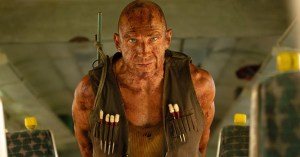Rank Ridley Scott’s 10 Best Movies
In this week's Total Recall, we count down the best-reviewed work of the Alien: Covenant director.
Over the course of his distinguished filmmaking career, Ridley Scott has dabbled in pretty much every genre: from historical epics to action flicks, fantasy to heartwarming drama, he’s done it all — and he’s racked up an impressive pile of awards and nominations along the way. But these days, he’s focused on expanding the Alien franchise — and with the latest installment, Alien: Covenant, landing in theaters this weekend, we decided now would be the perfect time to take a fond look back at 10 of the brightest critical highlights from the Ridley Scott oeuvre. You know what that means: it’s time for Total Recall!
1.

(Photo by 20th Century Fox)
Lean, aggressive, and lethally effective, Alien laid out a handful of ingredients and aimed them at the audience with ruthless precision. “In space, no one can hear you scream,” promised the poster’s tagline, and that’s as effective a summary as any for a sci-fi/horror hybrid that trapped an increasingly panicked crew on a spaceship hurtling across the galaxy — with a murderous, slavering alien stowaway that announced its presence by bursting out of an astronaut’s chest and only got nastier from there. It’s an admirably elegant setup, and Scott pulled it off just about perfectly; while the Alien franchise has definitely had its high moments since, it all goes back to the cruel simplicity of the original — and a movie that, as Glenn Lovell argued for the San Jose Mercury News, remains “one of the few sci-fi films that deserves to be called a masterpiece.”
2.

(Photo by Aidan Monaghan/20th Century Fox courtesy Everett Collection)
A few years after returned to space (and the Alien) franchise with Prometheus, Scott left Earth again with The Martian, a film adaptation of the hit Andy Weir novel about a botanist astronaut (Matt Damon) left stranded on Mars after his ship’s crew is forced to abandon him on the surface of the planet. Working from a script by Drew Goddard (The Cabin in the Woods), Scott crafted a showcase for a tour de force performance from Damon, who spends much of the movie in a solo fight for survival — and despite the life-or-death stakes of the situation, the end result is not only packed with pulse-pounding drama, it’s one of the flat-out funniest films of the director’s career. “What makes this epic personal,” mused Manohla Dargis for the New York Times, “is Mr. Scott’s filmmaking, in which every soaring aerial shot of the red planet is answered by the intimate landscape of a face.”
3.

Scott won the Best First Film prize at Cannes for his debut, an adaptation of Joseph Conrad’s short story The Duel. Starring Harvey Keitel and Keith Carradine, this 1977 drama centers around the bitter rivalry between a pair of officers in Napoleon’s army who spend their careers violently attempting to settle a long-standing grudge. While certainly not one of Scott’s biggest hits, it offered a glimpse of the distinctive flair and vision he’d fully come into later in his career; as David Hughes noted for Empire, “The richness of Scott’s visuals, the excellence of the performances and the depth of the themes combine to make a minor masterpiece.”
4.

(Photo by Warner Bros. courtesy Everett Collection)
By 1982, Scott was riding on the afterburners of Alien and Harrison Ford was one of the most bankable stars in the business, but not even their combined marquee mojo was enough to keep Blade Runner from whiffing at the box office when it was originally released. All’s well that ends well, though — more than a quarter century and a handful of expanded cuts later, Blade Runner is regarded as one of the smartest, most enduring sci-fi films ever made. Still, looking back, it isn’t hard to understand filmgoers’ initial confusion; at the time, Ford was mostly known for playing wisecracking, reluctant heroes, and his role here — the burned-out cop Rick Deckard — was a far cry from Han Solo or Indiana Jones. Though it was slow to find its audience, critics were quick to applaud Blade Runner; the Chicago Reader’s Jonathan Rosenbaum, for instance, called it “The most remarkably and densely imagined and visualized SF film since 2001: A Space Odyssey” and “a hauntingly erotic meditation on the difference between the human and the nonhuman.”
5.

(Photo by MGM courtesy Everett Collection)
After enduring middling reviews and mild box office success with 1989’s Black Rain, Scott earned some of the best reviews of his career with the follow-up: Thelma & Louise, the 1991 hit about a pair of women (played by Susan Sarandon and Geena Davis) who leave behind their regular lives for a road trip that quickly goes awry. Scott earned his first Academy Award nomination for his work here, one of six for the film (including Best Actress noms for Davis and Sarandon and Best Original Screenplay for Callie Khouri, who won). Calling it “an exhilarating vehicle” for its leads, the Washington Post’s Rita Kempley wrote that Thelma & Louise “spins its wheels in a giddy sort of way, then puts the pedal to the mettle, lays rubber and fairly takes wing.”
6.

(Photo by Warner Bros. courtesy Everett Collection)
There’s nothing quite like watching a good old-fashioned con movie; unfortunately, most of them tend to forget the “good” part, mistaking random twists and double-crosses for character development and a sensible plot. Not so, Ridley Scott’s adaptation of Eric Garcia’s Matchstick Men, starring Nicolas Cage and Sam Rockwell as a pair of grifters plotting a big score against a wealthy businessman. As Roy, the mentally unstable con man who is forced to question his life’s work after the sudden appearance of the daughter he’s never met, Cage is allowed to act at his sweaty, tic-ridden best; Roy’s countless ailments — including OCD and agoraphobia — tap into the nervous energy that has fueled all his finest performances. Though not all critics took Matchstick Men‘s bait (Garth Franklin of Dark Horizons called it “an example of Scott at his worst”), the cast earned positive notices for its work — particularly Cage, who is, in the words of the Kansas City Kansan’s Steve Crum, “absolutely terrific down to his eye twitches and neck jerks.”
7.

(Photo by Universal Pictures courtesy Everett Collection)
Scott reunited with his Gladiator star Russell Crowe for this sprawling, torn-from-the-headlines drama about Harlem-based heroin smuggler Frank Lucas (Denzel Washington, also reunited with Crowe for the first time since 1995’s Virtuosity) and his years-long struggle to evade the scrutiny of Richie Roberts, the relentless cop who dogged Lucas’ operation. As Roberts, Crowe got to sink his teeth into an uncommonly complex character, while Washington made the most of his first (and, to date, only) screen outing with Scott. Released in November 2007, American Gangster was expected to be a major Oscar contender, and though it mostly disappointed on that front, netting only two nominations (including Best Supporting Actress for Ruby Dee), Gangster was still a sizable hit, especially considering its two-and-a-half-hour length. In the words of Chris Vognar of the Dallas Morning News, “Ridley Scott packs the film with period detail and vivid, violent energy reminiscent of high-grade Scorsese, then mixes in a Lumet-like, keenly observed outrage at systemic corruption.”
8.

Working from screenwriter Ken Nolan’s adaptation of the Mark Bowden book about the real-life Battle of Mogadishu, Scott directed this war thriller with gritty precision, using an eclectic ensemble cast (including Ewan McGregor, Josh Hartnett, Tom Sizemore, Orlando Bloom, and Jeremy Piven) to take audiences into the trenches with soldiers fighting to kill or capture a Somali warlord. A $172 million hit, Black Hawk Down also earned the admiration of critics such as Michael Wilmington of the Chicago Tribune, who called it “A first-rate war movie that presents its subject so horrifyingly well that it doesn’t need to probe or preach.”
9.

(Photo by DreamWorks courtesy Everett Collection)
The swords ‘n’ sandals genre had been pretty well left for dead by the time Ridley Scott took the helm of Gladiator — which might have something to do with why the project didn’t exactly race on its way to the screen, and why the script bounced around between three credited writers and countless adjustments before it debuted in May of 2000. But by the time audiences got their first glimpse of Russell Crowe as an unjustly enslaved Roman general, Gladiator had the look and feel of an Oscar winner — and win it did, piling up five Oscars (including Best Picture and Best Actor for Crowe) and a whopping $457 million worldwide gross. As for the critics? Well, they liked it too — including Jim Halverson of the Sacramento News & Review, who wrote, “Scott triumphantly transports us back to the Roman Empire circa 180 A.D. with a painter’s eye for detail, a proven talent for manufacturing exotic realities (such as the future shock of Blade Runner) and a sweet tooth for utter spectacle.”
10.

(Photo by Columbia Pictures courtesy Everett Collection)
Scott suffered a pair of high-profile commercial disappointments in the early-to-mid ‘80s with Blade Runner and Legend, so for his next film, he decided to keep things simple: 1987’s Someone to Watch Over Me is, at heart, a fairly standard cop-and-dame thriller about a socialite (Mimi Rogers) who falls under the protection of an NYPD detective (Tom Berenger) after she witnesses a murder. It didn’t break Scott’s string of box office duds, but Watch won over critics who were willing to forgive its formula script thanks to his strong visual style; as Michael Wilmington put it for the Los Angeles Times, “Illogical, flawed or forced thrillers are all too common. Ones that knock your eyes out are rare.”








